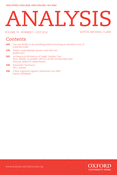-
Views
-
Cite
Cite
Paul Henne, Vladimir Chituc, Felipe De Brigard, Walter Sinnott-Armstrong, An Empirical Refutation of ‘Ought’ Implies ‘Can’, Analysis, Volume 76, Issue 3, July 2016, Pages 283–290, https://doi.org/10.1093/analys/anw041
Close - Share Icon Share
Abstract
Most philosophers assume that ‘ought’ implies ‘can’, and most of them hold that this principle is true not only universally but also analytically or conceptually. Some skeptics deny this principle, although they often admit some related one. In this article, we show how new empirical evidence bolsters the skeptics’ arguments. We then defend the skeptical view against some objections to the empirical evidence and to its effect on the traditional principle. In light of the new evidence, we conclude that philosophers should stop unconditionally assuming that ‘ought’ implies ‘can’.




